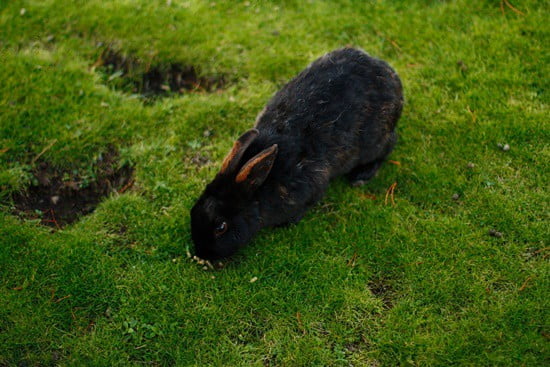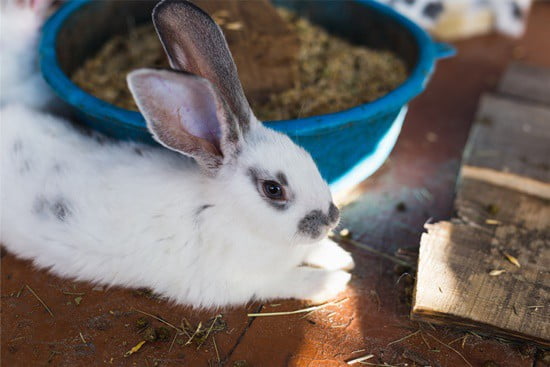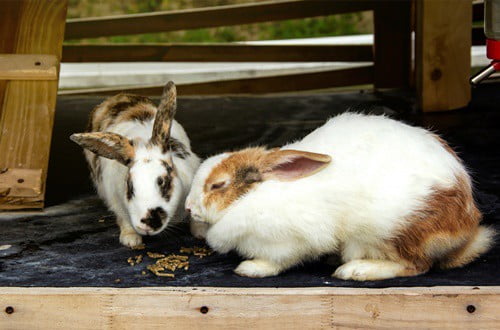Despite eating heartily and often, you’ll never find regurgitated food in a rabbit’s hutch. This will leave you wondering if your rabbit can produce vomit, or if it’s being concealed in some way.
Rabbits are physically incapable of vomiting. Your pet does not have a gag reflex. In addition, a rabbit’s small and delicate stomach muscles lack the strength to vomit. Your pet’s diaphragm cannot muster the power to propel food through her throat.
This sounds like good news, but it isn’t. If your rabbit cannot vomit, she cannot purge her stomach. This leaves her at risk of intestinal blockages if she over-eats. She also can’t cleanse herself of toxins.
Why Can’t Rabbits be Sick?
According to PLoS One, Rabbits lack a gag reflex, so it’s impossible to vomit. Rabbits do not know how to vomit. All the things that make humans throw up will not apply to a rabbit. Your pet will keep eating, ignorant of any danger she is placing herself in.
In addition to lacking a gag reflex, rabbits have a thin, weak diaphragm. This means that your pet lacks the strength to vomit. Essentially, her digestive tract is a one-way street. Food enters through the mouth and exits as feces.
As she does not know about vomiting, your rabbit will not be cautious about it. There are certain warnings that we know will make us sick. Rabbits have no reason to think this way. Your pet will be relying on you, without even realizing it. Rabbits must never reach a stage where this is necessary.
Do Rabbits Regurgitate in Any Way?
The closest thing that rabbits come to vomiting is coughing. Rabbits can cough, but will rarely do so unprompted. If your rabbit is coughing, typically it means one of two things.
- Your rabbit is unwell. She has a viral infection, such as snuffles.
- Something stuck in the throat. She is trying to clear it.
Trapped airways will require urgent intervention. If a rabbit’s throat is blocked, she won’t be able to eat, drink, or breathe. Rabbits cannot vomit. This will not happen naturally, and it cannot be induced. Feeding a rabbit hydrogen peroxide will not make her throw up. It may kill her, though.
Health Problems Caused by Not Vomiting
An inability to vomit means less cleaning up after your pet. Despite this, an inability to vomit is not a positive physical characteristic. It leaves rabbits susceptible to a range of health concerns.
- Digestive blockages. Digestive system blockages are a constant risk. If a rabbit overeats, she cannot vomit out undigested food. It sits in her digestive tract, causing an obstruction.
- Choking. Your rabbit may face a choking hazard. If food gets stuck in her throat, she’ll struggle to remove it. You’ll need to step in, before your rabbit loses the ability to breathe.
- Toxicity. If your rabbit eats something toxic, she can’t purge it by vomiting. This is why rat poison kills rodents. Many small animals have the same issues with vomiting as rabbits.
Never take a relaxed approach to your rabbit’s inability to vomit. Ensure that she’s fed an appropriate diet and keep her away from anything toxic.

Not Vomiting Blocks a Rabbit’s Digestive System
Owners need to be careful when it comes to feeding rabbits. Your pet may be small and dainty, but she likely doesn’t eat that way. Many rabbits are greedy, and will eat anything in sight.
Never share your lunch with your rabbit, no matter how much she begs. Foods, like bread and meat, can have dire consequences. Your rabbit will happily eat these foods, but won’t digest them. This can cause an intestinal blockage.
This occurs when your rabbit eats more than she can digest. Foods that are unsuitable for rabbits will sit in her stomach. This means your pet cannot gain sufficient nutrition or water.
The way around this is to provide your pet with a supply of hay. Hay is one thing that’s impossible for a rabbit to each much off. The fiber present in hay will also speed along the digestive process.
With no end to her hay supply, even the greediest rabbit will be happy. A small supply of pellets will also be fine. If you wish to offer a treat, stick to small pieces of fresh fruit or veg.
You should also keep one eye on your rabbit’s grooming. As she cannot vomit, swallowing fur can be dangerous. If she is not careful, your rabbit will fill her gut with her own hair.
A small number of hairballs in your rabbit’s poop are to be expected. If she is struggling to eliminate, hair may be filling and blocking your pet’s intestines. She will need urgent medical treatment.
Not Vomiting Can Lead to Blocked Airways in Rabbits
While your rabbit cannot vomit, she is more than capable of choking. If your pet has eaten to excess, or too quickly, her airways can block. Some rabbits tend to eat fast, and are prone to this condition. Warning signs of a rabbit with a blocked airway typically include:
- Attempting to breathe through the mouth. Rabbits are obligate nasal breathers. If your pet’s mouth is open, something is wrong.
- Constant shaking of the head. Your rabbit is trying to loosen something that is trapped.
- Walking backwards on the hind legs, especially if the head is tilted back. Your rabbit is desperately trying to suck in air.
- Bulging around the eyes. This is a universal sign of a lack of oxygen.
Your rabbit may also make a range of sounds. Coughing is most likely. Rabbits are frequently silent animals. If your pet is being noisy, there will be an explanation.
If your rabbit does have a blocked airway, it means that she is choking. As you can imagine, this can quickly become fatal.
How to Help a Choking Rabbit
It’s crucial that you remain calm as growing stressed will panic your rabbit. There are two ways, similar to the Heimlich maneuver, that you can use. The first method is as follows:
- Firmly hold your rabbit against your chest. Ensure that you are supporting her head and neck.
- Point your rabbit’s nose downward. This part is awkward, but vital.
- Using your fingers, massage your rabbit’s tummy from the base of her abdomen to her ribs. Don’t push too hard as you may break a rib. You’ll need to apply a degree of pressure, though.
- This will place pressure on your rabbit’s lungs. This, in turn, will create a surge of air. All being well, this will be enough force to remove a trapped item from the throat.
- The item will fall out of your rabbit’s mouth. As her head is facing downward, this will not slip back into her throat.

In some cases, this will not work. The foreign object may be too firmly trapped. In such an instance, try this technique:
- Place the rabbit between your forearms, holding her firm.
- Raise the rabbit in the air, still holding firm. It’s critical that your pet doesn’t squirm.
- Swing your arms downward. This will push your rabbit’s internal organs up into her body. This places pressure on the lungs. A strong breath will follow that is strong enough to dislodge the choking hazard.
- You may need to attempt this two or three times to see results.
After a choking incident, take your rabbit for a check-up. She may be in shock. Traces of the foreign object may remain in her throat.
Rabbits Cannot Vomit After Consuming Toxins
Another sizeable danger posed by your rabbit’s inability to vomit is the ingestion of toxins. Your rabbit cannot throw up if she swallows poison. Equally, you cannot induce vomiting to clear it.
As PetMD explains, rabbit intoxication is typically treated with intravenous fluids. In short, a vet needs to flush these poisons out. This can take some time, and it is not always successful. As a result, you should be careful to keep your rabbit away from any toxins. These include:
- Pesticides and herbicides on grass and plants.
- Rodent poisons in communal areas.
- Poisonous wild plants. Some indoor plants are also toxic.
- Human medications.
- Lead-based products.
- Spoiled or moldy food/hay.
- High-dosage flea treatments. Never use a cat or dog flea treatment on a rabbit. Equally, never fit your rabbit with a flea collar.
If you suspect that your rabbit has been poisoned, seek immediate medical help. The symptoms typically involve seizures, fluctuations in temperature, loss of appetite, and general lethargy.
A rabbit’s inability to vomit places your pet at risk of otherwise innocuous hazards. Watch her food intake carefully and keep her away from anything toxic. It’s the only way to keep her safe.

